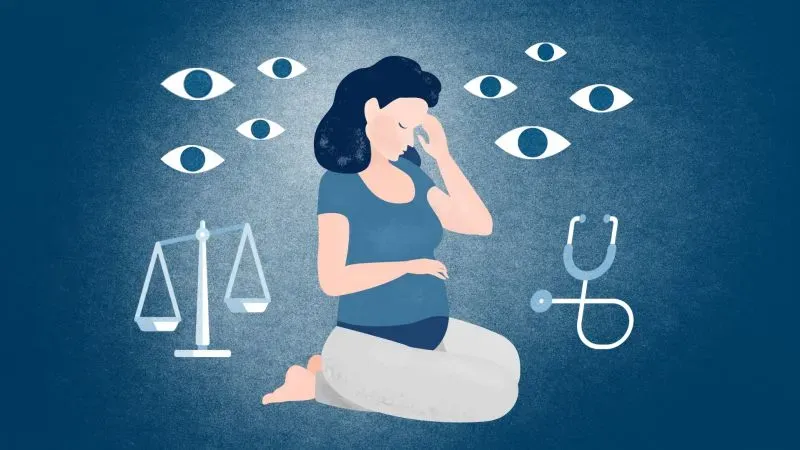Abortion laws have become a heated topic in recent years, deeply influencing the landscape of women’s reproductive rights. In South Carolina, the stringent abortion restrictions enacted through the six-week fetal heartbeat law have particularly sparked debate, as they impact many women’s personal health decisions, often with dire consequences. For those like Elisabeth Weber, who faced a devastating situation involving a non-viable pregnancy, these laws can lead to a nightmarish experience, emphasizing the harsh reality of being forced to carry a dead fetus against one’s will. Anti-abortion advocates often argue for the protection of life, yet these regulations can lead to forced pregnancies and emotional turmoil for grieving mothers. The complexities surrounding these laws expose the need for critical dialogues around reproductive choices, healthcare access, and the implications for women’s autonomy over their own bodies.
Women’s reproductive policies, especially surrounding the issue of abortion, have garnered significant public attention and controversy. Advocates who believe in safeguarding the unborn often impose strict limits on how and when healthcare can be accessed, severely impacting individuals facing difficult medical situations. In states like South Carolina, recent legislative measures create obstacles that prevent timely care for women who discover their pregnancies are not viable. This introduces an urgent conversation about the balance between protecting life and ensuring that women are not subjected to unnecessary suffering due to restrictive laws. The moral landscape regarding abortion continues to evolve, highlighting the critical need for policies that respect the health and well-being of women.
Personal Transformation in the Face of Abortion Restrictions
Elisabeth Weber’s journey from being an anti-abortion advocate to questioning the rigor of abortion restrictions exemplifies a profound personal transformation. Growing up steeped in ultra-conservative church teachings, she protested against what she viewed as moral failings in those who sought abortion. However, her own harrowing experience of being forced to carry a non-viable pregnancy has reshaped her beliefs. This drastic shift highlights how personal experiences can challenge long-standing ideologies, especially in the realm of women’s reproductive rights.
Weber’s ordeal serves as a compelling narrative about the implications of stringent abortion laws. She articulated her suffering as a result of South Carolina’s harsh regulations, which dictate that no abortion can occur after a fetal heartbeat is detected. Her experience is not unique, as many women find themselves trapped by restrictive laws that do not consider individual circumstances. This situation fosters a deeper understanding of the critical need for compassion and flexibility within abortion laws, providing room for medical discretion when dealing with tragic cases.
The South Carolina Abortion Ban: A Heartbreaking Case Study
The South Carolina abortion ban is emblematic of the increasing restrictions being placed on women’s reproductive rights across the United States. The legislation, which prohibits abortions after six weeks, often disregards the realities faced by many women who encounter medical complications during pregnancy. Elisabeth Weber’s case underscores the harsh realities of these laws, as they forced her to endure a painful situation that many would deem inhumane. Rather than providing care, the law dictated her medical choices, reflecting a broader trend of prioritizing ideological views over women’s health.
Many advocates argue that such stringent abortion restrictions exacerbate the trauma faced by women in similar situations to Weber’s. By denying them timely access to necessary medical interventions, the system risks severe physical and mental health consequences. The legal framework should strive to ensure that women can make informed choices without fear of retribution or legal ramifications, particularly in cases involving fetal demise. As Weber’s story spreads, it raises awareness about the need for reform in legislation like South Carolina’s, advocating for women’s autonomy over their bodies.
Evaluating Forced Pregnancy and Its Consequences
Forced pregnancy is a distressing issue that arises from stringent abortion laws, as evidenced by Elisabeth Weber’s heart-wrenching experience. Being compelled to carry a dead fetus for weeks not only poses serious health risks but also inflicts emotional and psychological trauma on the mother. This situation raises critical questions about the implications of anti-abortion laws for women’s well-being and autonomy. Forced pregnancy denies women the right to make decisions regarding their bodies, often leading to severe repercussions that can last a lifetime.
The physical repercussions of forced pregnancy can be devastating. In Weber’s case, the risk of hemorrhaging and developing serious infections exacerbated her situation. Moreover, the prolonged agony of waiting for the pregnancy to end naturally created immense emotional turmoil, highlighted when she expressed her grief in a viral video. Such narratives serve as powerful reminders of the need for policies that prioritize women’s health and ensure every woman receives compassionate care, particularly in tragic circumstances that the law currently overlooks.
The Role of Anti-Abortion Advocates in Shaping Laws
Anti-abortion advocates have historically played a significant role in shaping restrictive abortion laws, fueled by deeply held beliefs about women’s reproductive rights. Their influence has resulted in regulations that prioritize fetal rights over the health and well-being of the mother, as seen in South Carolina’s strict abortion ban. Elisabeth Weber, once an advocate herself, reveals the complexities and contradictions these laws can create, especially when faced with personal tragedies that challenge ideological perspectives.
The push for stricter abortion regulations often ignores the nuanced realities that many women face, illustrating a disconnect between advocacy and empathy. As Weber’s transformation from pro-life supporter to a critic of the law demonstrates, the voices of those affected by such laws are essential in informing public discourse. Legal frameworks that embrace a more compassionate approach could better reflect the diverse experiences of women, placing their health and autonomy at the forefront of reproductive health discussions.
Compassionate Care: The Need for Change in Abortion Laws
Elisabeth Weber’s painful journey highlights the pressing need for change in abortion laws to accommodate the realities of women’s health. Laws that impose strict limitations without considering individual circumstances can lead to tragic outcomes, such as prolonged suffering in non-viable pregnancies. Advocates for more compassionate care argue that abortion laws should allow for exceptions that respect women’s autonomy and address medical emergencies. This shift is crucial in recognizing the legitimacy of women’s experiences and ensuring they receive the care they deserve.
Promoting change in legislation requires a collective effort to amplify women’s voices and shed light on the personal stories that underscore the necessity for reform. By examining cases like Weber’s, society can better understand the need for empathy in the legislative process. There is a growing call for lawmakers to revisit restrictive abortion laws and consider more humane options that prioritize women’s health and decision-making power, thereby fostering an environment where compassionate care is accessible to all.
The Personal Cost of Abortion Restrictions
The personal cost of abortion restrictions extends beyond the immediate physical implications; it often results in profound emotional distress for women like Elisabeth Weber. After experiencing the tragedy of losing a child to miscarriage, being forced to endure a lengthy wait while carrying a nonviable fetus can be a heart-wrenching ordeal. The psychological toll can lead to long-term mental health issues, including anxiety and depression, which are often overlooked in discussions about legislative policies.
Weber’s experience emphasizes that the consequences of abortion restrictions are not solely about legal boundaries but also about the very real effects on women’s lives. Understanding the personal toll behind the statistics and laws is essential in creating a framework that supports women’s reproductive rights. As society navigates these critical issues, acknowledges individual stories, and endeavors to create solutions that consider both legal and emotional dimensions, true progress can be achieved.
Changing Perspectives on Women’s Reproductive Rights
Elisabeth Weber’s story represents a significant turning point in the broader conversation about women’s reproductive rights and the often rigid frameworks surrounding them. Her personal struggle illustrates how exposure to adverse realities can catalyze change in belief systems, prompting advocates and ordinary citizens alike to reconsider the implications of rigid anti-abortion policies. This evolution in perspective underscores a growing awareness of the need for laws that empower rather than restrict.
As more individuals share their transformative experiences, it paves the way for a more inclusive dialogue around women’s health issues. The change in Weber’s stance reflects a wider societal shift towards recognizing the importance of personal agency in reproductive health decisions. This deeper understanding urges communities and lawmakers to align legal frameworks more closely with the realities women face, ensuring that reproductive rights are not just theoretical but practical and accessible for everyone.
Awareness and Advocacy for Women’s Health
Raising awareness about the harsh realities faced by women due to restrictive abortion laws is crucial in advocating for change. Elisabeth Weber’s viral TikTok video has sparked conversations about the need for reform in how laws treat non-viable pregnancies. By bringing personal narratives to the forefront, advocates can shine a light on the complexities surrounding abortion, particularly for those who find themselves in dire medical situations. This heightened awareness can mobilize public opinion and challenge lawmakers to reconsider existing legislation.
Moreover, storytelling is a powerful tool in advocacy. By sharing their experiences, women like Weber can resonate with audiences on an emotional level, fostering greater empathy and understanding. Advocacy efforts must continue to engage communities in discussions about reproductive rights and the implications of abortion restrictions. As more individuals rally for compassionate policy changes, there is hope for a future where laws prioritize the health and well-being of women, freeing them from the burdens of outdated and harmful regulations.
Legislative Challenges and the Future of Abortion Rights
As the landscape of women’s reproductive rights continues to evolve, the challenges presented by restrictive abortion laws become increasingly apparent. Elisabeth Weber’s narrative serves as a microcosm of the struggles faced throughout the country, where legislative measures often overshadow women’s experiences. The future of abortion rights hinges on the ability to adapt laws that reflect contemporary understanding of women’s health needs and promote their rights to make informed choices about their bodies.
In navigating these legislative challenges, it becomes essential for advocates to push for reforms that ensure legal protections align with medical realities. Protecting women’s reproductive rights requires not only a legal fight but a cultural shift that recognizes the humanity of each person affected by these laws. By addressing the misconceptions surrounding abortion and emphasizing the need for compassionate care within health care systems, advocates can pave the way for a more equitable future in reproductive health.
Frequently Asked Questions
What are the main abortion laws in South Carolina regarding women’s reproductive rights?
South Carolina has imposed a near-total abortion ban that prohibits abortions after six weeks of pregnancy, coinciding with the detection of a fetal heartbeat. This law significantly restricts women’s reproductive rights by limiting access to abortion services, even in cases of non-viable pregnancies or medical emergencies.
How do abortion restrictions in South Carolina affect women facing medical complications?
Abortion restrictions in South Carolina complicate situations for women like Elisabeth Weber, who experienced a dead fetus but was unable to terminate the pregnancy due to the six-week abortion ban. Women facing medical complications must often wait for definitive evidence of health risks before doctors can legally perform an abortion.
What exceptions exist under South Carolina’s abortion laws?
Under South Carolina’s abortion laws, exceptions are made only in cases of medical emergencies, rape, or incest reported in the first trimester. However, even in non-viable pregnancy cases, women may face significant delays before receiving necessary medical care, highlighting the harsh impact of these anti-abortion laws.
How can the impact of the South Carolina abortion ban on women’s mental health be assessed?
The South Carolina abortion ban can severely impact women’s mental health, particularly those forced to carry non-viable pregnancies. The emotional toll of such experiences, as shared by women like Elisabeth Weber, underscores the need to consider women’s emotional well-being alongside legal restrictions on abortion.
What are the potential health risks associated with South Carolina’s abortion restrictions?
The abortion restrictions in South Carolina pose several health risks, including the potential for severe infections or hemorrhaging if women are compelled to continue a pregnancy that has been medically determined to be non-viable. These risks illustrate the dangers of restrictive abortion laws, which can endanger women’s health and safety.
Are there any movements against abortion restrictions in South Carolina?
Yes, there is ongoing advocacy against abortion restrictions in South Carolina, as many organizations and individuals are working to protect women’s reproductive rights. Stories like that of Elisabeth Weber highlight the urgent need for reforms in abortion laws to better accommodate women’s health and choices.
How does Elisabeth Weber’s experience challenge current abortion laws in South Carolina?
Elisabeth Weber’s experience of being forced to carry a dead fetus due to South Carolina’s abortion laws challenges the current narrative of abortion restrictions by illustrating the real-life consequences these laws have on women’s health and autonomy, amplifying calls for reform.
What resources are available for women impacted by South Carolina’s abortion laws?
Women impacted by South Carolina’s restrictive abortion laws can seek support from various organizations, including reproductive health clinics and advocacy groups that provide resources, counseling, and legal assistance regarding women’s reproductive rights and access to necessary medical care.
| Key Points |
|---|
| Elisabeth Weber, an anti-abortion advocate, is now facing the consequences of strict abortion laws in South Carolina. |
| Weber’s pregnancy ended tragically as her baby was found to be non-viable at a nine-week ultrasound. |
| Due to a six-week abortion ban, she was forced to carry a deceased fetus, risking her health for weeks. |
| Despite medical recommendations for termination to prevent infection, South Carolina’s laws prevented action until risk was imminent. |
| Weber has publicly shared her story, emphasizing the broader implications of strict abortion laws on women in similar situations. |
| Following this experience, Weber has shifted her views on abortion and distanced herself from her previous conservative beliefs. |
Summary
Abortion laws have significant implications for health and personal autonomy, as illustrated by Elisabeth Weber’s harrowing experience. Once an advocate against abortion, Weber’s situation illuminates the harsh realities imposed by South Carolina’s strict six-week abortion ban. This law not only affects elective procedures but also severely limits medical options for women facing tragic and complex pregnancy situations. Weber’s story highlights the urgent need for discussions surrounding abortion laws and their real-world impact on women’s health and emotional well-being, making it crucial for society to reevaluate these policies.



